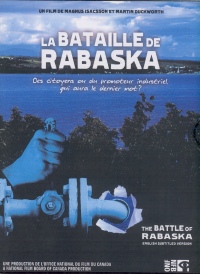| ________________
CM . . .
. Volume XVII Number 26. . . .March 11, 2011 
 |
La Bataille de Rabaska : The Battle of Rabaska.
Magnus Isacsson & Martin Duckworth (Writers & Directors). Johanne Bergeron (Producer).Yves Bisaillon (Executive Producer).
Montreal, PQ: National Film Board of Canada, 2008.
78 min., 20 sec., DVD, $99.95.
Order Number: 153C 9909 262.
Subject Heading:
Rabaska (Project).
Grades 10 and up / Ages 15 and up.
Review by Frank Loreto.
*** /4
|
| |
|

A few summers ago, my wife and I spent a week at Isle d'Orlean. This jewel in the St. Lawrence, not far from Quebec City, is a wonderful place to visit and, according to many, a perfect place to live. This was put in jeopardy when plans were announced to construct a major Liquid Natural Gas (LNG) complex across the river at Beaumont, Quebec. Many locals objected and launched a successful protest. The plan was defeated by the local council, and, for a short while, the environment seemed to win out over big industry. However, when the LNG plans were taken to the council in Levis, Quebec—just next door to Beaumont, those opposed were outnumbered and a different story unfolded. The Battle of Rabaska is a classic David and Goliath story, but, in this case, Goliath came armed with powerful friends and the rock not only missed, but it was thrown back.
The Battle of Rabaska begins with a young family preparing for a protest rally. The children are being coached to say, "No to the gas port." When they gather to voice their objection to the LNG facility, they are met with many others, and there is an atmosphere of victory. The people involved, doctors, nurses, musicians, environmental activists and regular citizens, band together, and with the support of local council, they successfully block the gas plant's construction. Had the film ended there, this would have been a darling of the environmental movement as it shows the power of grassroots politics.
The cheering hardly stops when the people learn that their neighbouring region has also been approached as a possible site. The LNG project promises millions of tax dollars, thousands of jobs and prosperity for the area. Government officials are also in favour as this would enhance its energy policy and exporting the gas would provide great revenue.
The protesters introduced at the beginning of the film vow to continue to fight this project as well, but they are clearly in over their heads. The Levis town council sees the project as a good thing. The local unions see value in the jobs that will be generated.
The battle is now between those who feel the environment will be at risk against those who see the immediate financial benefits. After several years of fighting, the protesters bank on holding a huge rally in Montreal to drum up support from other environmentalists. The rally is so poorly attended, their defeat is clear. The project, accepted by local council, passes an environmental assessment even though the protesters point out that it violates Quebec's commitment to the Kyoto Protocol.
Throughout the film, the people who lead the protest are given time to speak, and the viewer gets to know them. They are not flashy or polished, but are simply people who see something horrible happening, try to stop it, and fail.
At the film's end, the LNG plant has been delayed, and the protesters are hoping to go to UNESCO for help, but one family has already moved away.
The Battle of Rabaska is a painful film to watch from an environmental point of view, but to those who feel that industry is to be encouraged, it would be a success story. However, the bias is clearly on the losing side.
While aspects of the film could be used in any Environment course or in Civics or Politics, The Battle of Rabaska in its entirety would not work in an English high school class. It is long, sub-titled and artfully slow. The filming is beautiful, and while the viewer shares the pain felt by those featured, some could accuse the film of being one-sided. The inherent danger or safety of LNG is still up for debate. However, as a film about the political process and how passion sometimes does not matter, The Battle of Rabaska shines and should be viewed by teachers. Recommended viewing, but not for class use.
Recommended with reservations.
Frank Loreto is a teacher-librarian at St. Thomas Aquinas Secondary School in Brampton, ON.
Reviewer's note: Pierre-Olivier Pineau's May 2010 study: Natural Gas Supply in Québec: Should the Rabaska LNG Terminal Project be Abandoned? states: "to Rabaska, the limited partnership has already obtained the key federal and provincial governmental approvals to proceed with contraction of the terminal. Construction would be timed to meet the anticipated first LNG deliveries in 2014. (http://zonecours.hec.ca/documents/H2010-P6-2405951.Case3-RabaskaLNG.pdf)

To comment
on this title or this review, send mail to cm@umanitoba.ca.
Copyright © the Manitoba Library Association. Reproduction for personal
use is permitted only if this copyright notice is maintained. Any
other reproduction is prohibited without permission.
NEXT REVIEW |
TABLE OF CONTENTS FOR THIS ISSUE
- March 11, 2011.
AUTHORS |
TITLES |
MEDIA REVIEWS |
PROFILES |
BACK ISSUES |
SEARCH |
CMARCHIVE |
HOME |
